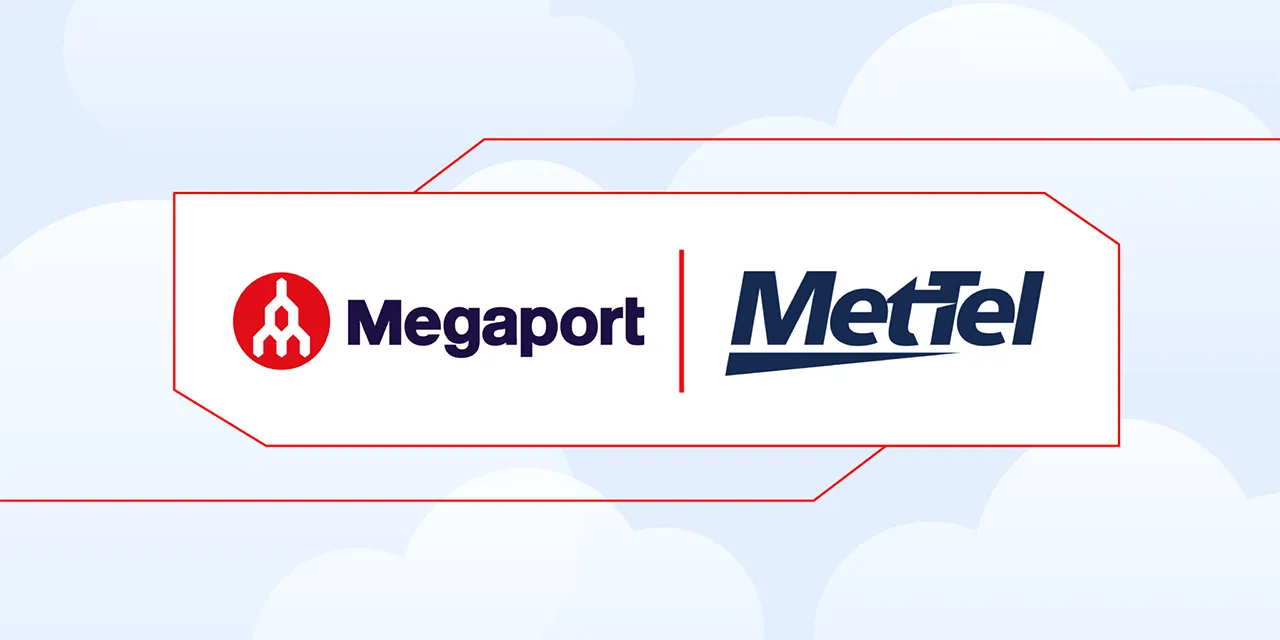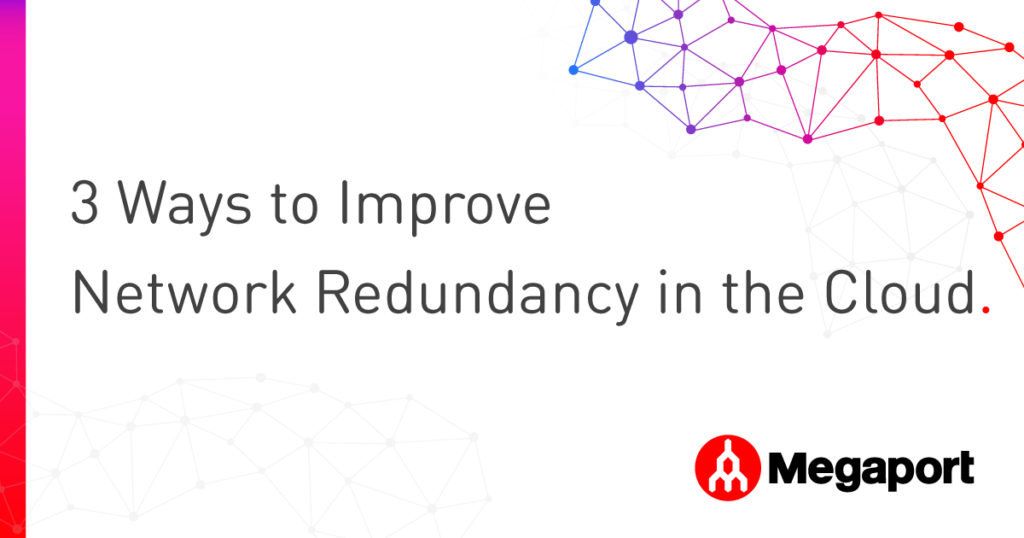
MetTel and Megaport Enable High Performance Applications in the Cloud
Before Megaport, MetTel’s customers battled impaired application performance and deployment delays when moving to the cloud. Now, their connectivity enables high-performance applications in the most distributed cloud environments. Here’s how.
Founded in 1996, MetTel started with a mission to broaden the variety of choice to optimized, end-to-end connectivity available to enterprises through partnering with the world’s leading telecommunications carriers and application providers.
Today, over 25 years on, the company is a Gartner Magic Quadrant Leader for Managed Network Services, providing strategies in Software-Defined WAN (SD-WAN), network security, and more to customers across the globe.
For their customers’ ensured growth, the MetTel team needed to offer a more secure and reliable way to connect to the cloud to reach customers’ business-critical applications. When they found that their enterprise customers were experiencing poor application performance when moving to the cloud, Megaport provided a high-performance, distributed platform to securely bring the cloud closer to their customers.
This then enhanced the ability for customers to reach applications faster, with speed increases of as much as 30%. By providing a secure alternative to the public internet, Megaport’s Network as a Service (NaaS) also meant MetTel’s customers’ (and their clients’) data was safe from cyberthreats.
Together with Megaport, MetTel and its specialized partners deliver cloud connectivity solutions to enterprises across a variety of industries, including Government, Retail, Healthcare, Financial Services, Energy & Utilities, Manufacturing, Transportation & Logistics, and Travel & Leisure.
The challenges
Poor network performance and latency
As MetTel’s customers were moving to the cloud, they were experiencing decreased application performance. Users were traversing the public internet to connect to the cloud which resulted in latency and jitter. Poor application performance meant costly disruptions to not only MetTel’s customers’ internal business processes but also pains for their subsequent customers.
Multi-vendor complications and delays in deployment
MetTel’s customers need individual connections to Cloud Service Providers (CSPs) for each application, which increased complexity and also presented difficulty for mutlicloud communication between applications due to different vendors having different licensing models and SLAs.
“From a cost perspective, from a licensing perspective, from an inventory perspective, and then from a human capital and management piece, it just has so much overhead to try to get customers’ individual application providers like that,” said Zachary Grant, Vice President Solution Architecture & Engineering of MetTel.
“AWS lets you spin up a virtual appliance. Azure lets you spin up a virtual appliance… different licenses, different speeds, different dynamics, where I can have a customer that needs access to four or five different clouds.”
This was an inefficient method of connecting to the cloud for MetTel’s customers, causing frustration and delaying their digital transformation.
Solutions
Distributed model
When MetTel partnered with Megaport, it gave them the opportunity to get away from centralized routing and instead move to a distributed model by leveraging both MetTel and Megaport’s networks.
Rather than needing to route traffic through MetTel’s centralized infrastructure—which relies on a single central server—customers now benefit from a distributed model, wherein they can connect directly to the closest CSP on-ramps using Megaport.
“MetTel partnered with Megaport to design its purpose-built virtual network on-ramps, allowing customers to access resources and applications directly off of MetTel’s backbone,” Grant said.
As MetTel and Megaport have many mutual points of presence across locations and data centers, interconnecting the two networks was easy, and as a result, MetTel was able to quickly extend its reach to the cloud by tapping into Megaport’s extensive footprint. The complimentary coverage mitigated issues of unnecessary hairpinning and subsequent low speeds that can occur when relying on complex overlays.
Using Megaport’s private and secure backbone, MetTel has been able to enhance their customers’ ability to reach their applications faster by as much as 30%.
“What we have done for our customers is we have taken a centralized access to broad applications, and we’ve created a distributed environment that reduces latency and therefore increases throughput to those apps for our customers,” Grant said.
Simple and quick provisioning
MetTel’s partnership with Megaport has significantly simplified how customers provision their connections across various locations and data centers, as well as augment their existing network infrastructure.
Using Megaport Virtual Edge (MVE), customers can provision virtual appliances on-demand, configure and manage their services in real time from an easy-to-use portal, and scale their connectivity up and down as they need with just a few clicks.
“When it comes to actually provisioning, it’s minutes to get services turned up,” Grant said.
“Not only did they receive and were able to consume MetTel services quicker. MetTel was able to bill them and actually onboard that revenue in a much faster manner.”
This has also sped up the time for MetTel to deliver their many assets and services to their customers in real time, which is boosting customer satisfaction and maintaining customer loyalty.
Megaport’s on-demand connectivity enhanced the ability for customers to reach applications faster, with speed increases of as much as 30%.
Vendor-neutral entry point
In response to the complications that connecting to multiple vendors was bringing, Megaport now serves as MetTel customers’ common entry point, wherein customers can plug into the Megaport NaaS and then privately and reliably connect to the clouds and applications they need to operate their business efficiently.
And as a vendor-neutral Network Function Virtualization (NFV) service, MVE combats the multivendor complications previously faced by allowing customers to easily connect to multiple applications across any of the CSPs on Megaport’s network.
“I think what Megaport provides is normalization of virtualized appliances so that it doesn’t matter what application provider our customers are going to,” Grant said.
Customers can be provided with one “virtual instance” and still access their suite of multiple clouds, saving the pain of creating multiple instances as well as the added complexity and cost that it brings.
“When it comes to actually provisioning, it’s minutes to get services turned up.” - Zachary Grant, Vice President (Solution Architecture & Engineering), MetTel
The benefits for customers
With Megaport, MetTel’s customers enjoy a range of improvements to their network performance and availability. Customers accessing cloud applications now experience reduced latency and additional throughput, meaning their business can run efficiently without costly performance disruptions.
Users can also scale their connections up or down within minutes depending on their changing needs, as well as quickly provision new network points of presence using MVE to serve a growing remote and distributed workforce.
Plus, enterprise customers have peace of mind knowing their mission-critical data (as well as that belonging to their own customers) is now protected over Megaport’s private network, away from the unreliable public internet.
Megaport’s NaaS is ultimately leading to significant cost savings for MetTel and their customers, who are now saving on simplified cloud models and reducing their cloud egress fees.
What’s next for MetTel?
MetTel has plans to continue to virtualize their SD-WAN using Megaport’s network, as opposed to using the various application providers’ networks.
“There’s 80 to 90 different application providers, and they all do things differently,” Grant said.
This 2023 initiative for virtualization through Megaport Virtual Edge (MVE) will greatly simplify network infrastructures by utilizing one virtual instance rather than dozens.
MetTel is also working on delivering simplified cloud-to-cloud routing solutions using Megaport Cloud Router (MCR) in the future.
MetTel will continue to play a pivotal role in its global customers’ digital transformation journey by providing reliable, cost-effective, and safe cloud connectivity solutions.
Discover how Megaport’s solutions could help you — book a demo today .


